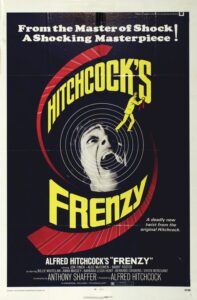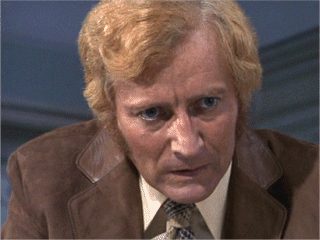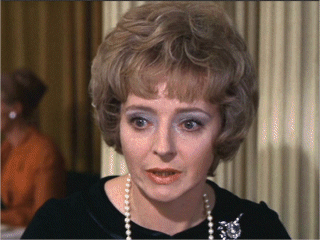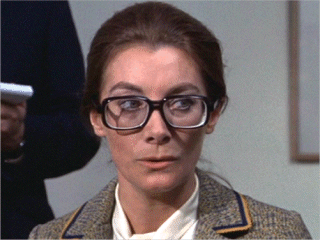|

Synopsis:
When he’s seen leaving the apartment of his recently murdered ex-wife (Barbara Leigh-Hunt), a down-on-his luck bartender (Jon Finch) is accused of being London’s infamous “Necktie Murderer”; meanwhile, the real culprit (Barry Foster) roams the city freely, and continues to put innocent women — including Finch’s girlfriend (Anna Massey) — at risk.
|
|
Genres, Themes, Actors, and Directors:
- Detectives and Private Eyes
- Falsely Accused
- Hitchcock Films
- Serial Killers
Review:
In his next-to-last film, Hitchcock returned to his native England, bringing with him a modern sensibility in horror. Gone are his masterfully oblique references to violence (as epitomized by the shower sequence in 1960’s Psycho); instead, we’re shown gruesomely overt murders with unmistakable sexual underpinnings. Indeed, it’s thoroughly unpleasant watching the first murder victim (sympathetic Leigh-Hunt) being raped and graphically choked to death — so we’re relieved when the next murder happens behind closed doors (btw, don’t read any reviews if you want the identity of this victim to remain a mystery). Fortunately, the film’s violence is balanced in Anthony Shaffer’s script by a healthy dose of levity (a police inspector wryly notes, “We haven’t had a good juicy series of sex murders since Christie.”), and Hitchcock’s sense of direction is in prime form, as shown in several notable sequences: the unexpected delay before Leigh-Hunt’s secretary (a humorously snippy Jean Marsh) finally lets out a scream upon encountering her boss’s body; Foster’s desperate struggle with a cadaver in a truckbed; Hitchcock’s camera slowly panning away from an apartment where a murder is about to take place. Finch is ultimately too morose and unsympathetic as the film’s unwitting protagonist, but Foster is appropriately duplicitous as his murderous mate, and the lead female performances (by Leigh-Hunt and Massey) are both solid. While Frenzy may not be prime Hitchcock, it’s certainly a worthy suspense film, and will likely be of interest to all film fanatics.
Redeeming Qualities and Moments:
- Barry Foster as the Necktie Murderer

- Anna Massey as ‘Babs’

- Barbara Leigh-Hunt as Brenda

- Jean Marsh as Brenda’s mousy, suspicious secretary

- Strong, suspenseful direction
Must See?
Yes, as a late-in-life film (his 55th!) by a master director.
Categories
(Listed in 1001 Movies You Must See Before You Die)
Links:
|





One thought on “Frenzy (1972)”
A once-must, though mostly for Hitchcock fans… and with a caveat.
~which is: this is a flawed film – and not one that, overall, I particularly like. On its release, much was made of it as Hitch’s ‘return to form’ (following what was considered the marginally successful ‘Marnie’ and the artistic failures of ‘Torn Curtain’ and ‘Topaz’). His return to England was also seen as a plus-factor.
As noted in the assessment, a few sequences show the director in admirably firm control and they are noteworthy. For example, in the scene in which there’s an “unexpected delay before [the] secretary… finally lets out a scream”, the ‘extra touch’ involves two women passing by in the street – who hear the scream and yet silently decide to not get involved.
The first (seen) murder is indeed horrific; some felt that Hitch had gone too far – and I would agree that, although the scene is meant to be disturbing, there is a fine line here that seems to have been crossed (for whatever reason). Here, Hitch seems to have aimed at out-doing himself in this follow-up to the (in)famous shower scene in ‘Psycho’. (It may not be a coincidence that the title ‘Frenzy’ is so similar to ‘Psycho’.) However, with this ‘centerpiece’ sequence, we are far removed from the sleek editing that ‘Psycho’ utilizes for suggestion; here we have the polar opposite and we see just about absolutely everything. It increases the indecency element.
As a viewer, what I find least satisfying is that the film is too often noticeably contrived. A film of this type will often be contrived and it becomes a matter of making it seem less so. But here, a number of coincidences (etc.) pile up uncomfortably and it becomes distracting.
At least one scene (which takes place in a park just after Finch and Massey spend time making love) appears so awkward as to defy logic – though Hitch does his best to keep us from noticing.
Still… most audience members may not be bothered by these flaws and may consider this to be among Hitchcock’s best work in the latter part of his career.
My own favorite sections are the two scenes in which Vivien Merchant is surprisingly effective and hilarious as the wife of the Chief Inspector played by Alec McCowen. (Theirs are my favorite performances in the film.) She is forever serving him up ‘exotic’ gourmet dinners which he quietly detests – yet she also proves herself to be quite deft as an amateur sleuth.